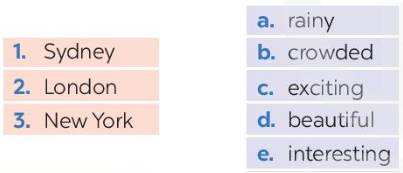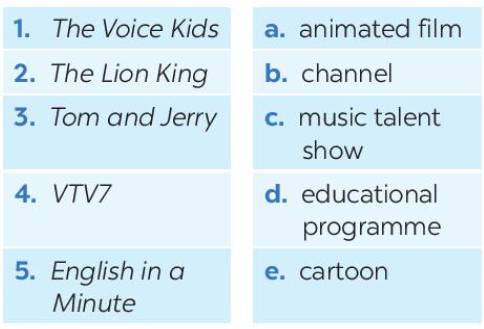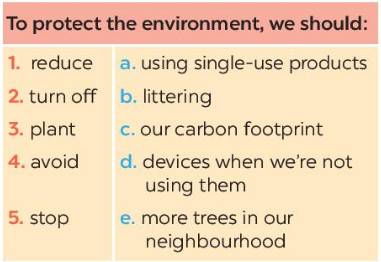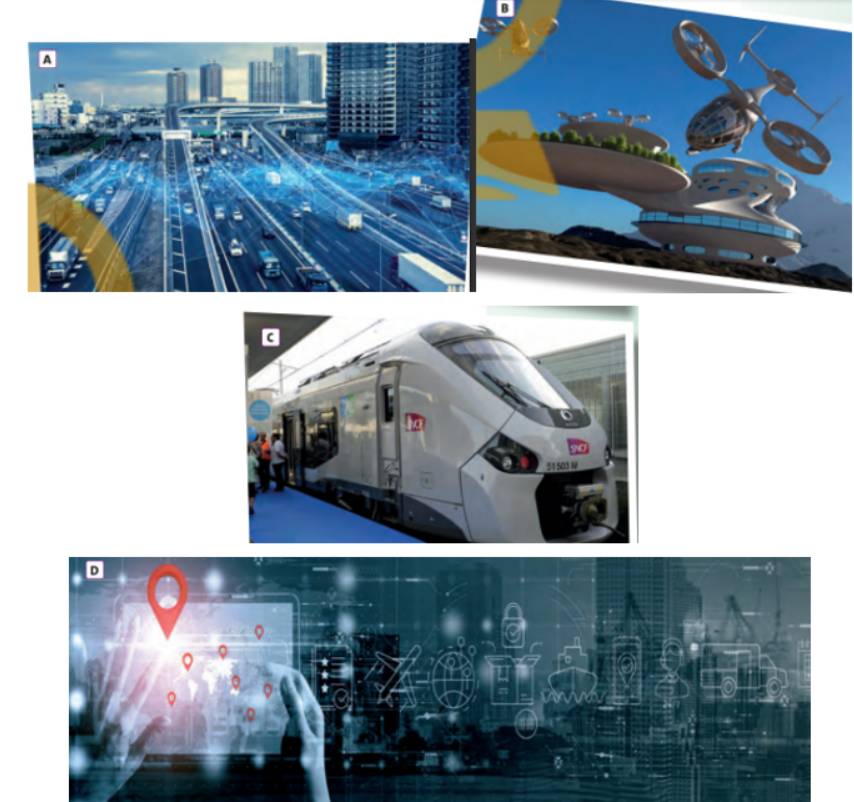Read the conversation again and match the cities with the adjectives describing them.

Read the article again and complete the summary with one word for each blank.
All of the highways and roadways in cities will become 1________ with IoT sensors which will process data of weather, crashes, traffic conditions and send them directly to users. Users will not have to drive. Cars as well as other vehicles will go 2________. The word 'Driver' will no longer be used. Traffic 3________ will be solved by tunnels. A 4________ system will run along 3D underground roads at high speed. Travelling from one city to another will not take much time thanks to air taxis. Green energy will be used for all means of transport, and the first concern is how to make effective 5________
Giải thích
1. smarter
- Sau động từ “become” (trở nên) cần một tính từ.
smarter (adj): thông minh hơn
All of the highways and roadways in cities will become smarter with IoT sensors.
(Tất cả các đường cao tốc và đường bộ trong thành phố sẽ trở nên thông minh hơn với các cảm biến IoT)
Thông tin: “Smarter roadways and highways in cities outfitted with loT sensors will process all kinds of data in real time and alert users of the best transport options.”
(Những con đường và đường cao tốc thông minh hơn ở các thành phố được trang bị cảm biến loT sẽ xử lý tất cả các loại dữ liệu trong thời gian thực và cảnh báo người dùng về các lựa chọn giao thông tốt nhất.)
2. autonomous
autonomous (adj): tự động
Cars as well as other vehicles will go autonomous.
(Ô tô cũng như các phương tiện khác sẽ chạy tự động.)
Thông tin: “Cars will not be the only thing to go autonomous.”
(Ô tô sẽ không phải là thứ duy nhất chạy tự động.)
3. congestion
- Trước động từ “will” (sẽ) cần một danh từ làm chủ ngữ
Cụm danh từ “traffic congestion”: kẹt xe
Traffic congestion will be solved by tunnels.
(Ùn tắc giao thông sẽ được giải quyết bằng đường hầm.)
Thông tin: “Tunnels will also be a smart choice because of the reduction of traffic congestion.”
(Đường hầm cũng sẽ là lựa chọn thông minh vì giảm ùn tắc giao thông.)
4. lift
Cụm danh từ “a lift system”: hệ thống thang máy
A lift system will run along 3D underground roads at high speed.
(Một hệ thống thang máy sẽ chạy dọc theo đường ngầm 3D với tốc độ cao.)
5. laws
Sau tính từ “effective” (hiệu quả) cần một danh từ.
law (n): luật
Green energy will be used for all means of transport, and the first concern is how to make effective laws.
(Năng lượng xanh sẽ được sử dụng cho mọi phương tiện giao thông, và vấn đề cần quan tâm đầu tiên là làm sao để luật hiệu quả.)
Thông tin: “There will still be issues to solve such as safety, speed and cost, and of course governments will need to make new traffic laws.”
(Sẽ vẫn còn những vấn đề cần giải quyết như an toàn, tốc độ và chi phí, và tất nhiên các chính phủ sẽ cần đưa ra luật giao thông mới.”)
Bài hoàn chỉnh
All of the highways and roadways in cities will become 1 smarter with IoT sensors which will process data of weather, crashes, traffic conditions and send them directly to users. Users will not have to drive. Cars as well as other vehicles will go 2 autonomous. The word 'Driver' will no longer be used. Traffic 3 congestion will be solved by tunnels. A 4 lift system will run along 3D underground roads at high speed. Travelling from one city to another will not take much time thanks to air taxis. Green energy will be used for all means of transport, and the first concern is how to make effective 5 laws.
Tạm dịch
Tất cả các đường cao tốc và đường bộ trong thành phố sẽ trở nên thông minh hơn với các cảm biến IoT sẽ xử lý dữ liệu về thời tiết, va chạm, điều kiện giao thông và gửi chúng trực tiếp đến người dùng. Người dùng sẽ không phải lái xe. Ôtô cũng như các phương tiện khác sẽ đi cầu tự động. Từ ‘tài xế' sẽ không còn được sử dụng. Ùn tắc giao thông sẽ được giải quyết bằng đường hầm Hệ thống thang máy sẽ chạy dọc các tuyến đường ngầm 3D với tốc độ cao. Di chuyển từ thành phố này sang thành phố khác sẽ không mất nhiều thời gian nhờ taxi hàng không. Năng lượng xanh sẽ được sử dụng cho tất cả các phương tiện giao thông, và vấn đề cần quan tâm đầu tiên là làm sao để luật có hiệu quả.
Read the conversation again. Then match the phrases whose meanings are the same.
What's wrong with you?
What is your problem?
to make yourself at home
How sad!
What a pity!
to relax and make yourself comfortable as you are at your own home.
feel kind of sick
feel weak and tired
Read the conversation again. Then match the phrases whose meanings are the same.
What's wrong with you? - What is your problem?
to make yourself at home - to relax and make yourself comfortable as you are at your own home.
How sad! - What a pity!
feel kind of sick - feel weak and tired
Read the conversation again and match 1-5 with a-e.

1. The Voice Kids - c. music talent show
(The Voice Kids – chương trình tài năng âm nhạc)
2. The Lion King - a. animated film
(Vua sư tử - phim có nhân vật hoạt hình)
3. Tom and Jerry - e. cartoon
(Tom và Jerry – phim hoạt hình)
4. VTV7 - b. channel
(VTV7 – kênh truyền hình)
5. English in a Minute - d. educational programme
(English in a Minute – chương trình giáo dục)
Read the conversation again and match the two halves in the two columns.

Club leader: Hello. Welcome back. Today we’re discussing environmental problems and environmental protection. What are our serious environmental problems now?
Nam: Pollution and habitat loss, I think.
Ann: I agree. The air and water quality are getting worse and worse.
Club leader: Any others?
Ann: Yes, I can think of some like global warming, endangered species loss, …
Nam: So what should we do to help protect our environment?
Club leader: We can reduce our carbon footprint even in our homes.
Ann: What do you mean by “carbon footprint”?
Club leader: It’s the amount of carbon dioxide we release into the environment.
Ann: I see. So we can do things like turning off devices when we’re not using them.
Club leader: Right … And there is much more we can do, like practising the 3Rs.
Nam: We can plant more trees in our neighbourhood too.
Ann: And try to avoid using single-use products, like plastic bags, and stop littering.
Club leader: Yeah. And we can volunteer at some local environment programmes to save endangered species.
1 - c: reduce our carbon footprint
(giảm thiểu lượng khí thải nhà kính)
2 - d: turn off devices when we're not using them
(tắt các thiết bị khi không sử dụng)
3 - e: plant more trees in our neighbourhood
(trồng thêm cây ở xung quanh nơi bạn sống)
4 - a: avoid using single - use products
(tránh các sản phẩm dùng một lần)
5 - b: stop littering
(ngừng xả rác)
Look at the pictures and match them with the ideas below Look at the title of the text. Which of the ideas of future cities do you think are mentioned in the text?
- Sky cities will be built with solar-run buildings.
- Internet will control every human activity.
- People will work in mobile offices.
- Underground trips will become safer and faster than ever.

Go Autonomous - GO GREEN
Since the birth of the car in 1886, transport in big cities has changed a lot. And it is no wonder that many experts think that there will be extraordinary changes in the next few decades.
As technology develops, highways, skylines, subways will be all transformed. Smarter sroadways and highways in cities outfitted with loT sensors will process all kinds of data in real time and alert users of the best transport options. Weather, crashes, traffic conditions will be communicated to users and smart stops will be found everywhere providing renewable energy, green hydrogen or even greener energy, ensuring efficiency and safety on every highway. Tunnels will also be a smart choice 10 because of the reduction of traffic congestion. Underground roads will be built in 3D with a lift system which will take vehicles deep underground and will allow traffic to attain the greatest speed without intersections.
There will also be innovations in the sky. Air taxis are not a new idea, but in the future they will be completely environment-friendly. Aviation gasoline will be no longer used. Green energy will be in place and cost-effective air taxis will enable people to travel from one busy urban city to another in record time.
New technologies such as Al and the rollout of 5G will pave the way for fully autonomous innovation. Cars will not be the only thing to go autonomous. Freight trucks, cargo vehicles, air taxis will all benefit from this technology and that is why 20 the term 'driver' will become extinct.
Transport will go green. Electric or hydrogen power will be mainstream. There will still be issues to solve such as safety, speed and cost, and of course governments will need to make new traffic laws.
- Sky cities will be built with solar-run buildings.
(Các thành phố trên bầu trời sẽ được xây dựng bằng các tòa nhà chạy bằng năng lượng mặt trời.)
- Internet will control every human activity. => Picture D
(Internet sẽ điều khiển mọi hoạt động của con người.)
- People will work in mobile offices. => Picture B
(Mọi người sẽ làm việc trong các văn phòng di động.)
- Underground trips will become safer and faster than ever. => Picture C
(Những chuyến đi dưới lòng đất sẽ trở nên an toàn và nhanh chóng hơn bao giờ hết.)
- I think the idea of future cities “Underground trips will become safer and faster than ever” is mentioned in the text.
(Tôi nghĩ rằng ý tưởng về các thành phố trong tương lai “Các chuyến đi dưới lòng đất sẽ trở nên an toàn hơn và nhanh hơn bao giờ hết” được đề cập trong văn bản.)
H. Listen again and read the conversation. Then practice the conversation with a partner. Switch roles and practice it again.
(Nghe lại lần nữa và đọc đoạn hội thoại. Sau đó thực hành đoạn hội thoại với bạn cùng luyện tập. Đổi vai và thực hành lại lần nữa.)
Graham: Hi, my name’s Graham. Nice to meet you.
Elsa: Nice to meet you, too. I’m Elsa.
Graham: What do you do, Elsa?
Elsa: I’m an engineer.
Graham: An engineer. That’s an interesting job!
Elsa: Yes, it is, but it’s difficult sometimes. What do you do?
Graham: I’m a forest ranger.
Elsa: Really? What’s that like? Is it exciting?
Graham: Yes, most of the time, but sometimes it’s boring. Just me and the trees!
Tạm dịch:
Graham: Xin chào, tên tôi là Graham. Hân hạnh được biết bạn.
Elsa: Tôi cũng rất vui được gặp bạn. Tôi là Elsa.
Graham: Bạn làm nghề gì vậy Elsa?
Elsa: Tôi là một kỹ sư.
Graham: Một kỹ sư. Đó là một công việc thú vị!
Elsa: Đúng vậy, nhưng đôi khi hơi khó khăn. Còn bạn làm nghề gì?
Graham: Tôi là kiểm lâm.
Elsa: Thật sao? Công việc đó như thế nào? Nó thú vị không?
Graham: Có, hầu hết thời gian là vậy, nhưng đôi khi nó rất nhàm chán. Chỉ có tôi và những cái cây!
Read the Recycle! box. Complete the sentences with the correct form of the adjectives in brackets. Then listen again and check.
Dialogue 1
1 The ______________ (sympathetic) you are, the (good) you'll be at the job.
2 I don't think idealism is ______________ (useful) as patience.
3 These days they have to work ______________ and______________ (long) hours.
Dialogue 2
4 I think that ______________ (important) quality is punctuality.
5 You'll certainly be______________ (popular) if you can laugh at things.
Dialogue 3
6 I think patience is less ______________ (important) physical courage.
7 Which do you think is______________(useful) quality of the three?
RECYCLE! Comparison a Key forms: kinder- the kindest more practical- the most practical less sociable-the least sociable (not) as intelligent as b We use double comparatives to say that something is changing. You're getting more and more impatient! c We use the... the and comparatives to say that one thing changes with another. The more arrogant you are, the less popular you'll be. |

Dialogue 1
1 The more sympathetic (sympathetic) you are, the better (good) you'll be at the job.
(Bạn càng thông cảm, bạn càng làm tốt công việc.)
2 I don't think idealism is as useful (useful) as patience.
(Tôi không nghĩ sự lý tưởng hữu ích bằng sự kiên nhẫn.)
3 These days they have to work longer and longer (long) hours.
(hững ngày này họ phải làm việc ngày càng nhiều giờ)
Dialogue 2
4 I think that the most important (important) quality is punctuality.
(Tôi nghĩ rằng phẩm chất quan trọng nhất là đúng giờ.)
5 You'll certainly be more popular (popular) if you can laugh at things.
(Chắc chắn bạn sẽ nổi tiếng hơn nếu bạn có thể cười vào mọi thứ.)
Dialogue 3
6 I think patience is less important than (important) physical courage.
(Tôi nghĩ tính kiên nhẫn ít quan trọng hơn sự mạnh về thể chất.)
7 Which do you think is the most useful (useful) quality of the three?
(Bạn nghĩ phẩm chất nào hữu ích nhất trong ba phẩm chất?)
Read the conversation again and tick (v) T (True) or F (False) for each sentence.
| T | F | |
| 1. The students finished their midterm tests. | ||
| 2. Minh mentions the different types of pressure they are facing. | ||
| 3. The teacher tells them to stay calm and word hard. | ||
| 4. The class will discuss their problems offline. | ||
| 5. The school has different clubs for its students. |
Teacher: It’s great to see you again, class! What's going on?
Minh: We've decided to use Facebook for our class forum, and we joined some school club activities. We're also preparing for the midterm tests. It’s really stressful.
Teacher: I'm sorry to hear that. I know exams may give you a lot of stress. But stay calm and work hard. What other pressure do you have?
Minh: Well, we also have pressure from our parents and friends.
Teacher: Do you? Let's discuss these problems in your new Facebook group. By the way, why did you choose Facebook?
Ann: Because it’s user-friendly.
Teacher: Good! How about club activities? Do you find them enjoyable?
Ann: Yes. This year there are some new clubs like arts and crafts, and music. The club leaders will provide us with a variety of activities to suit different interests. And there will also be competitions as usual.
Teacher: Awesome! I hope you all can join the clubs you like.
1. F
The students finished their midterm tests.
(Các học sinh đã hoàn thành các bài kiểm tra giữa kì.)
Thông tin: We've decided to use Facebook for our class forum, and we joined some school club activities. We're also preparing for the midterm tests. It’s really stressful.
(Chúng em đã quyết định dùng Facebook cho diễn đàn của lớp, và chũng em đã tham gia vào một số hoạt động câu lạc bộ của trường. Chúng em cũng đang chuẩn bị cho thi giữa kì. Mọi thứ rất là áp lực.)
2. T
Minh mentions the different types of pressure they are facing.
(Minh nhắc đến những loại áp lực khác nhau họ đang đối mặt.)
Thông tin: We've decided to use Facebook for our class forum, and we joined some school club activities. We're also preparing for the midterm tests. It’s really stressful. Well, we also have pressure from our parents and friends.
(Chúng em đã quyết định dùng Facebook cho diễn đàn của lớp, và chũng em đã tham gia vào một số hoạt động câu lạc bộ của trường. Chúng em cũng đang chuẩn bị cho thi giữa kì. Mọi thứ rất là áp lực. Tụi em cũng có áp lực từ cha mẹ và bạn bè nữa.)
3. T
The teacher tells them to stay calm and work hard.
(Giáo viên nói với họ bình tĩnh và học tập chăm chỉ.)
Thông tin: I'm sorry to hear that. I know exams may give you a lot of stress. But stay calm and work hard. What other pressure do you have?
(Cô rất tiếc khi phải nghe điều đó. Cô biết là kì kiểm tra gây ra cho tụi em rất nhiều áp lực. Nhưng hãy bình tĩnh và học tập chăm chỉ. Các em còn những áp lực nào khác không?)
4. F
The class will discuss their problems offline.
(Lớp sẽ thảo luận về những vấn đề này trên lớp.)
Thông tin: Do you? Let's discuss these problems in your new Facebook group. By the way, why did you choose Facebook?
(Em sao? Hãy thảo luận những vấn đề này trên nhóm Facebook mới của tụi em đi. Nhân tiện thì, sao em chọn Facebook?)
5. T
The school has different clubs for its students.
(Trường có nhiều câu lạc bộ khác nhau cho học sinh của họ.)
Thông tin: Yes. This year there are some new clubs like arts and crafts, and music. The club leaders will provide us with a variety of activities to suit different interests. And there will also be competitions as usual.
(Có ạ. Năm nay có rất nhiều câu lạc bộ mới như vẽ, thủ công hoặc âm nhạc. Các chủ tích câu lạc bộ đưa ra một loạt các hoạt động để phù hợp với các sở thích khác nhau. Và vẫn sẽ có các cuộc thi như thường lệ.)
c. Read the Conversation Skill box and listen to Task b. audio again. Number the phrases in the Conversation Skill box in the order you hear them.
(Đọc bảng Kỹ năng hội thoại và nghe Bài tập b. một lần nữa. Đánh số các cụm từ trong bảng Kỹ năng Hội thoại theo thứ tự bạn nghe thấy.)
Conversation Skill Staring a friendly conversation (Bắt đầu một bài hội thoại thân thiện) To start a friendly conversation, say: (Để bắt đầu một bài hội thoại than thiện, hãy nói) Hey (, Sam). How’s it going? (Này, Sam. Mọi việc sao rồi?) Hi (, Lisa). How are you doing? (Chào, Lisa. Bạn vẫn khỏe chứ?) |
1: Hey, Sam. How's it going?
2: Hi,Lisa. How are you doing?